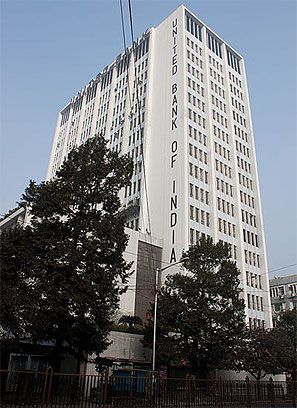State-run United Bank of India (UBI), which has seen erosion of capital due to bad loans and higher provisioning, will be told by the Reserve Bank of India (RBI) to implement prompt corrective action.
 Once this is initiated, the bank will have to present and implement a capital restoration plan, and restrict expansion of risk-weighted assets. And, not be allowed to enter new businesses, while being barred from accessing high-cost deposits. Also, there would be no dividend payment.
Once this is initiated, the bank will have to present and implement a capital restoration plan, and restrict expansion of risk-weighted assets. And, not be allowed to enter new businesses, while being barred from accessing high-cost deposits. Also, there would be no dividend payment.
Such corrective actions are enforced if non-performing asset (NPA) ratios increase beyond a certain level and capital falls below the mandated one.
The Kolkata-based lender reported a net loss of Rs 1,238 crore (Rs 12.38 billion) in September-December 2013, as compared to Rs 42 crore (Rs 420 million) of profit during the same period of 2012. This was due to a 500 per cent increase in provisioning, to Rs 1,783 crore (Rs 17.83 billion). However, a large part of the provisioning was also due to wages and benefits to employees, seen as a one-off item.
The prompt corrective actions are both structured and discretionary — some steps are mandatory and the regulator reserves the right to impose others. After the bank posted Rs 489 crore of loss in the second quarter, the central bank had ordered a forensic audit by an external agency. This report was given a few days earlier. Based on the observations, the central bank will order the future course of action.
According to sources, lax credit appraisal was one reason for the NPA rise. Technology was also found to have been manipulated (flagged items were hidden) by branch staff, to suppress NPA. UBI intially accused deficiencies in Infosys' Finacle software for failing to identify NPA in its small loan accounts, a charge promptly dismissed by the software major.
On Thursday, however, UBI took a U-turn and issued a joint statement with the software company, saying there were no issues with Finacle's NPA tool.
Infosys had explained the base software comes with only basic features; banks then customise the application. The enhancements and customisation are only done when a bank makes a specific request.
"UBI, through their application service provider, HP, have recently approached us with a request to implement this in their environment and we are helping the bank in this regard,” Infosys said. Infosys also noted a majority of banks in India, which run on Finacle, are managing to address asset classification and NPA reporting in line with RBI norms and without hiccups. Developed in 1999, Finacle is currently used by 183 banks across 84 countries and the technology firm claims the software serves 14 per cent of the world's banked population.
Fresh slippages were a little over Rs 3,000 crore (Rs 30 billion) during the quarter, resulting in gross NPA hitting 10.82 per cent of the total or Rs 8,546 crore. For the nine-month period, it is having a net loss of close to Rs 1,700 crore (Rs 17 billion). NPA from large industries was Rs 2,384 crore (Rs 23.84 billion) and from small and medium enterprises, Rs 2,436 crore (Rs 24.36 billion).
The central bank can also use its discretion to impose further conditions, such as immediate capital infusion. In such a case, say bankers, the government will have to dilute its stake, for raising funds.
“Given the health of the bank, investors will not be interested if the fresh issuances are priced substantially below the present market price,” said a senior banker.
UBI's capital adequacy ratio fell to 9.01 per cent (Basel-III norms) by the end of December 2013. The tier-I capital adequacy ratio was 5.59 per cent, well below the regulatory requirement of 6.5 per cent which banks need to maintain from March 2014 under Basel-III. The board of directors has approved raising of Rs 1,000 crore (Rs 10 billion) tier-I capital in the coming months.
Other discretionary action includes reducing the exposure in sensitive sectors such as real estate and the capital market, revising credit and investment strategy, and possible barring from accessing the interbank market.
UBI's management has set an ambitious target of reducing NPA by at least Rs 2,000 crore (rs 20 billion) in the next two months. It is to step up its recovery drive and is confident of improving its working results in the current quarter. In addition, the bank has lowered its deposit rate, raised its minimum lending rate and is introducing cost control measures.
A MIXED BAG...
WORRIES
ERODING PROFITABILITY
* Net loss more than doubled to Rs 1,239 crore sequentially in October-December quarter
RISE IN BAD LOANS
* Fresh slippages topped Rs 3,000









